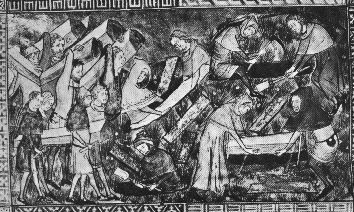
|
||
| |
New
This Week
Everything new is here.
Basics
Start here
Anglicans believe . . .
The Prayer Book
The Bible

News
News
Centre
News archive
Newspapers online
Over
to you . . .
Add a site to AO
Tell us what you think
Link to AO
Resources
Resources A to Z, including
Book of Common Prayer
Education
Exchanges
Liturgy
Theology
Vacancies
Youth
and
much more ...
Worldwide
Anglicanism
Anglican Communion
In full communion
Not in the Communion
Dioceses
and Parishes
Africa
Australia
Canada
England
Europe
Ireland
Japan
New Zealand
Scotland
USA
Wales
World
Vacancies
Centre
Look for openings round
the Communion.
Support
Anglicans Online
Sip from an AO mug,
wear our t-shirt, or ...
Make a secure online
donation in any amount
you choose.
Anglicans Online
Back issues
Staff
Awards and Publicity
Beginnings, AO
today
Sponsors
 Hallo
again to all.
Hallo
again to all.
In late August, 1348, a young mother named Elspeth died of black plague in Melcombe Regis, near Bristol, in England. Her husband and children never understood why this evil overcame her, and lived in fear until they, too, died of the plague.
In mid October, 2002, a 19-year-old girl named Angela Golotta, of Adelaide, was killed by a bomb that exploded in a popular nightclub in Bali. At about the same time, a sniper in Washington DC killed Linda Franklin while she and her husband loaded goods into their car.
What these deaths have in common is that they were incomprehensible to the victims and their families, and contributed to a sense that we are not safe.
For most of the time throughout history that people have written about their feelings, they have written that they haven't felt safe. You could never know when a fatal disease would strike, a war break out, a bandit attack, or a fire start. You said your prayers every day, and thanked God for every meal, because you could never be sure that you would have another chance. In the simple old days, before modernism, before the Enlightenment, people believed in God, said prayers, went to church, and made their confessions because they were afraid not to. A precious few did this because they wanted to; no doubt many of them went on to become priests and bishops.
By the late 19th century, science had explanations for most things. By the middle of the 20th century, science and technology offered protection from most dangers: burglar alarms, penicillin, microsurgery, anti-missile missiles, polio vaccine, chlorinated water, sun-block creams, insect repellents. Science offered an explanation of all things, and technology could then be developed to protect us against those that were harmful.
 Oddly
enough, it was Alfred Hitchcock's movie of Daphne Du Maurier's short story 'The Birds', released in March, 1963, that made us first notice
that technology could not repel fear. Weapons could stop one or two birds, but not all of them. Eight months later John Kennedy was killed
by a sniper. Within a year or two the Vietnam war was in full swing. To our minds, the 19th-century idea that no properly-trained scientist
could believe in God was now officially dead, but it was decades before public behaviour started to change accordingly.
Oddly
enough, it was Alfred Hitchcock's movie of Daphne Du Maurier's short story 'The Birds', released in March, 1963, that made us first notice
that technology could not repel fear. Weapons could stop one or two birds, but not all of them. Eight months later John Kennedy was killed
by a sniper. Within a year or two the Vietnam war was in full swing. To our minds, the 19th-century idea that no properly-trained scientist
could believe in God was now officially dead, but it was decades before public behaviour started to change accordingly.
In the 14th century, when people felt unsafe, they didn't try to understand the dangers that they faced, and rarely did they try to thwart them individually. There were too many, and they were too incomprehensible. So they said prayers, carried good-luck charms, obeyed their clergy, and hoped for the best. In the 21st century there is a pervasive belief that it is possible to understand all dangers and to use some combination of technology and government to fend them off. But modern-day gentry still spend their money on castles and moats, even if they don't call them that.
Science can explain diseases, earthquakes, plagues, pestilence, and even a rain of frogs. It falls short of being able to explain evil. Perhaps the devil needs to work a bit harder now than he did in the 14th century; back then the plague was enough to spread fear. Now, in order to spread fear, the devil must work through means that science has not addressed, such as politics, madness, airplane crashes, terrorism, or hatred.
It indeed feels a dark world at present. We feel safe because we know that we are in the arms of a loving God. We feel safe because we know that the Holy Spirit accompanies us everywhere, and we have tried hard to train ourselves to feel the presence of the Spirit. We feel safe because even if some tragedy claims our earthly lives, we shall then be closer to God. No one wants to die, and no one wants their loved ones to die. But our unwavering faith assures us that we shall die safely, if such a thing can be.
Whilst we are on this earth, we want to savour every moment, stay in the light, and use the gifts that God gave us to communicate our love of God, faith, and our quirky old Anglican church as widely as we can.
See you next week. Utterly unafraid.

|
 |
| Cynthia
McFarland cmcf@anglicansonline.org |
Brian Reid reid@anglicansonline.org |
Last updated: 20 October 2002
URL: http://anglicansonline.org/